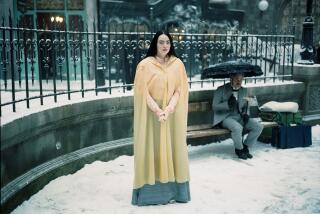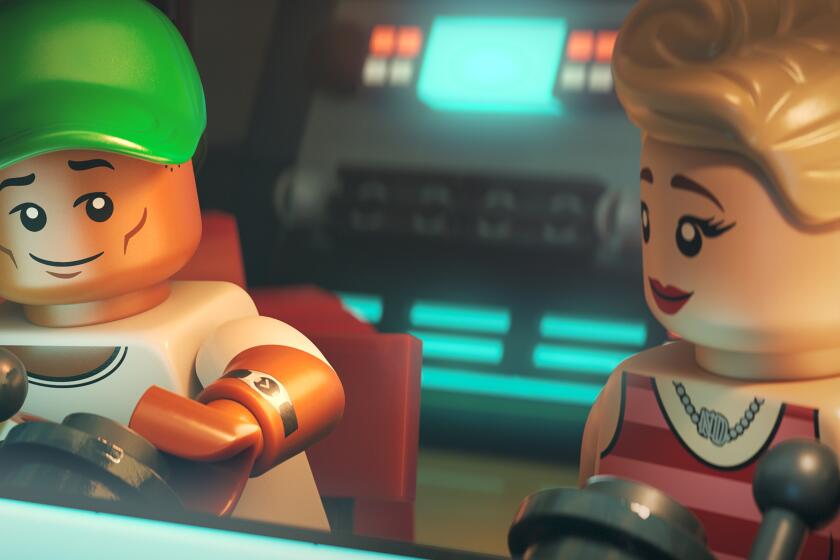A day-glo hero who’s flatter off the page
After a decade vanquishing evil inside the panels of a comic book, the big red fighting machine known as Hellboy has taken a much-anticipated leap onto the big screen. Ushered into the world with painstaking detail and the affectionate ministrations of director Guillermo del Toro, the movie version of Mike Mignola’s superhero weighs in as an enjoyable if somewhat neutered defender of the free world. Make no mistake: Hellboy still has a hide as hard-boiled as Lee Marvin in “The Dirty Dozen,” but now he’s also wearing a smile.
Born to be wild, Hellboy enters under the darkest shadow. As in the original comic, he pops into the movie world in 1944 just as Rasputin (Karel Roden) is staging a comeback. The mad, now immortal monk has thrown in with Hitler to take over, you know, the world, by unleashing the spawn of Satan. The story opens with Rasputin, eyeballs and muscles bulging, summoning Hellboy out of the void with the aid of a personal she-wolf (Bridget Hodson), his delightfully wicked henchman, Kroenen (Ladislav Beran, with Del Toro supplying the grunts) and what looks like most of the Nazi SS. Stuff goes ka-boom, extras go ka-splat and thanks to some U.S. military muscle and a Baby Ruth candy bar the newly hatched Hellboy takes an unexpected detour for good.
After the slam-dunk opener featuring a baby Hellboy who’s so red he looks like he just popped out of the oven -- which, in a manner of speaking, he has -- the story fast-forwards to the present, where it settles into a more familiar action groove. (Del Toro’s screenplay combines some of Mignola’s old comics with new material by the director and Peter Briggs.) Raised by the professor Trevor “Broom” Bruttenholm (John Hurt in the later years), the now-overgrown Hellboy (Ron Perlman) works for a secret U.S. military division called the Bureau for Paranormal Research and Defense (B.P.R.D.). Alongside the aquatic Abe Sapien (Doug Jones, voiced by David Hyde Pierce) and a phalanx of men in black, Hellboy and Broom rout supernatural villainy with the usual tricks and tools of the trade -- meaning, mostly, guns that go bang-bang.
Played by the gruffly appealing Perlman under form-fitting foam and a candy-apple paint job, Hellboy is a sight to behold. His look -- including two shaved horns that sit on his forehead like motorcycle goggles -- fuses the square-jawed macho of Lee Marvin and old comic-strip adventurers like Steve Canyon with the freaky mutant appeal of the Fantastic Four and X-Men. A devil-man of brute force and few choice words, Mignola’s creation weighs in as street-smart rather than learned and inclined to world-weary observation. (“What a life,” he sighs in one lonely comic-book panel.) Mignola has described his hero as a “working-class kind of guy who just so happens to also be the beast of the Apocalypse,” and it’s this capsule vision that Del Toro has tried to take to his fan-boy heart and to which he’s been most faithful.
Yet if the working-class beast of the Apocalypse is still on the prowl, the story and Mignola’s eccentricities have gone AWOL. Rasputin comes back, naturally (and supernaturally), intent on finishing his unfinished evil business. Hellboy moons like a puppy-love-struck teen over another B.P.R.D. agent, the fire-starter Liz Sherman (Selma Blair), and gets all territorial -- at work and in love -- with a new agent, John Myers (likable newcomer Rupert Evans). Despite Perlman’s cigar chomping and hard-boiled delivery, the whole thing is disappointingly straight. The big red one muscles through the plot with admirable vigor, but Del Toro fails to push the story and its weird potential with comparable energy, in all likelihood because the filmmakers are after a younger, certainly less sophisticated audience than the one that turned the comic into a cult.
Much like its titular character, Del Toro’s “Hellboy” is principally a triumph of design over meaning. In many respects, by fusing shiny New World gadgetry with decaying Old World gentility, the director -- working in tandem with production designer Stephen Scott and the equally gifted cinematographer Guillermo Navarro -- has created an excellent surface approximation of the original comic’s hybrid origins. (Mignola counts the old pulp magazine “Weird Tales” and various world folk stories as among his many diverse inspirations.) There’s no shortage of slick special effects and rampaging monsters here. Yet what catches the eye and captures the imagination is the lovingly hand-crafted feel of the design, the sensuous swirls etched into Hellboy’s torso, the dusty clutter of the professor’s office, the queasy algae-green of a locked hospital cell.
Like most filmmakers who try to turn comic books into cinema, Del Toro and his talented team are far more successful in conveying a sense of what happens rather than how stuff happens. There’s more to successful comics than cool-looking heroes, cooler-looking villains and far-out storytelling. There’s pacing, negative space, abrupt shifts into abstraction and variably sized panels that are read side by side (forward, backward, slowly and fast as you please), all of which is difficult to translate into film and commercially risky. As it happens, the greater battle in the movie isn’t between Hellboy and Rasputin but between two different mediums with distinct ways of making meaning and with very dissimilar economic goals. The comic book Hellboy just wants to conquer evil, but -- no surprise -- his movie double wants to conquer the world.
*
‘Hellboy’
MPAA rating: PG-13 for sci-fi violence and frightening images
Times guidelines: Consistent violence; may be too intense for younger children.
Ron Perlman...Hellboy
John Hurt...Trevor “Broom” Bruttenholm
Selma Blair...Liz Sherman
Jeffrey Tambor...Tom Manning
Karel Roden...Grigori Rasputin
Rupert Evans...John Myers
Revolution Studios presents a Lawrence Gordon/Lloyd Levin production in association with Dark Horse Entertainment, released by Columbia Pictures. Director-writer Guillermo del Toro. Story Guillermo del Toro, Peter Briggs. Based on the comic created by Mike Mignola. Producers Lawrence Gordon, Mike Richardson, Lloyd Levin. Director of photography Guillermo Navarro. Production designer Stephen Scott. Editor Peter Amundson. Music Marco Beltrami. Music supervision Peter Afterman, Margaret Yen. Running time: 2 hours, 1 minute.
In general release.
More to Read
Only good movies
Get the Indie Focus newsletter, Mark Olsen's weekly guide to the world of cinema.
You may occasionally receive promotional content from the Los Angeles Times.









